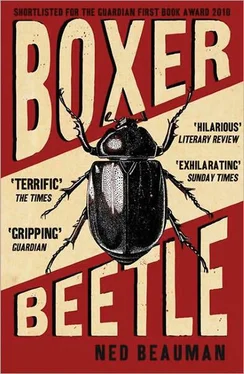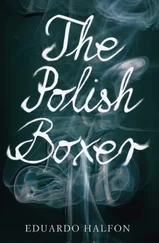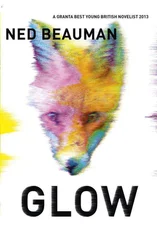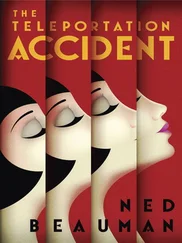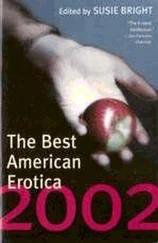‘Two hundred. Mr Roach, you do not realise how perfectly you. … No one can take your place, sir. Wouldn’t you like to accompany your sporting triumph with a scientific one? I hope that my humble work will make at least some tiny contribution to a project which will, without a doubt, be of wonderful lasting benefit to our whole race. The finest minds of Europe and the United States are coming together to—’
‘What are you going on about?’
‘Eugenics, Mr Roach. Have you heard of it?’
‘Is this cunt boring you, Seth? Pardon me, I mean “this gentleman”.’ Kölmel chuckled. He stood in the doorway holding a cigar. Like Frink, Kölmel was stocky and flat-nosed, but fatter and balder than his cousin. ‘That was a hint, mate,’ he added.
‘Is there any chance you might reconsider?’ said Erskine quietly to Sinner.
‘Fuck off back to your beetles.’
‘Very well. None the less, I shall leave my card on the table, in case you should have a change of heart. Goodbye, gentlemen,’ said Erskine, and went out.
‘Why are you wearing a fucking overcoat on a day like this?’ Kölmel shouted after him, but there was no reply. Kölmel turned back to Sinner. ‘Who was that?’
‘Some fucking bum-boy toff.’
‘What did he want?’
‘Put me in a freak show.’
‘You should have someone on the door here, Sinner.’
Sinner shrugged.
‘Anyway, came to give my congratulations.’
‘You taking the piss?’
‘You were murdering him, son. You could see his knees tremble. That’s what counts. Pock joking about at the end like that, that don’t come into it. You know Joe Schmeling actually won a title claiming a foul? They say his trainer had a cup with a big dent in it, kept it in his pocket every day just in case. Came good that time — slipped it in the cunt’s shorts like a conjurer.’
Sinner was seven years old when he first met Albert Kölmel, helping his father pack up the vegetable stall on a Saturday night in February. Until 1927 Kölmel still made his rounds personally, but even back then he behaved as if Spitalfields Market was his alone, strolling around like a factory owner inspecting his machines. One hand held a cigar and the other was permanently clenched into a fist, and the young Sinner was thrilled to think that Kölmel was always so close to knocking someone’s lights out that it wasn’t even worth uncurling his fingers. Only later did he realise that inside the fist was hidden, implied, Kölmel’s weapon of choice: a razor blade stuck into a wine cork, about an eighth of an inch of steel protruding, a sharp tongue, enough to scar a man’s face but not enough to kill him. A man like Kölmel would be an idiot to carry a knife or a gun or anything else that could get you caught and hanged if something went wrong — better, if you really had to punish a man, to hold him down and cut deep into his upper lip, so that later, when the scar tissue formed and pulled the lip upward, his mouth would be permanently twisted open. Or there were other pranks, without the blade. Once Bryan Harding had tried to make Kölmel pay full price for his portion of fish and chips, so Kölmel picked up Harding’s cat and threw her into his deep fat fryer.
‘This your boy?’ Kölmel had said on that February evening.
‘Here,’ said Sinner’s father, passing Kölmel five shillings without meeting his eye.
‘What’s your name, son?’ Kölmel said to Sinner, who was sorting mouldy turnips from good ones. Around them were the scavengers: first the very poor, the very mean and the very old, who would wait until the end of the day to get the unwanted produce for the lowest prices, and then the homeless, the crippled and the mad, who would scurry along to gather up the detritus on the ground, looking for squashed fruit and vegetables, cardboard for bedding, and bits of broken wooden boxes that would help to make a fire. To Sinner, a market like this was just a ceaseless battle against decay, a mere waiting room for the huge rubbish dump on Back Church Lane: squint for long enough against that high wind of putrefaction, and surely before long it would begin to blow years from your own life, so you’d start to smell rotten yourself; better to work in a chemist’s or a sweet shop, where the shiny pellets in the glass jars could be nine centuries old for all anyone knew. At the same time, there was something lovely about the market in the early mornings, when he was rarely here: everything ablaze with freshness but nobody much around, like the beginning of creation. Except that, at the beginning of creation, God had not yet even conceived of a creature like Albert Minyo, who could shout nothing but ‘Saveloys! Saveloys! Saveloys! Saveloys! Saveloys! Saveloys! Saveloys! Saveloys! Saveloys! Saveloys! Saveloys!’ eight hours a day for thirty years.
‘My name’s Seth,’ Sinner had replied.
‘You got any brothers and sisters?’
‘Anna’s my little sister.’
‘I’d like to meet her. Well, see you again, Seth. Much obliged, Mr Roach,’ said Kölmel, patting him on the shoulder.
After Kölmel had gone, Sinner knew from his father’s expression not to ask who the man was or why he was taking money; but a few weeks later, when Alfeo turned up on a Sunday with plasters on both sides of his face, Sinner felt almost sure it had something to do with Kölmel. (Sinner didn’t know that, if you had asked Kölmel, he would cheerfully have assured you of his purposes: the money would help to prevent dirty new immigrants from setting up in the market to compete with the established stall-holders.) Either way, he couldn’t help seeing Kölmel as a benevolent figure, particularly since Alfeo loved to give Sinner a hard cuff over the head whenever he went near Alfeo’s cakes. And he didn’t mind seeing his father get humiliated. Intimidation was a kind of conquest, and Sinner liked conquest.
By the time Sinner was nine, he was working for Kölmel at the wet docks. Clutching a rinsed-out petrol can and a ‘rum pipe’ (a few inches of metal pipe glued to a foot of rubber tubing), he and another Whitechapel boy would creep down to the creaking wooden platforms where barrels of rum or port were being unloaded. There, with the other boy on lookout, he would ‘suck the monkey’: jam the metal end of the rum pipe under the barrel’s stopper, suck on the rubber end until liquid began to flow, fill the can, replace the lid, and wait while the other boy filled his own can; then they’d run off — snatching a lime or a banana or even a pineapple from a crate on the way, dockers spitting curses as they passed — slow down after a couple of minutes to walk panting and giggling through Limehouse, and swap their cans with one of Kölmel’s men for a few pence when they got home. That was how Sinner got his first taste of anything stronger than the froth on his father’s ale. It made you grimace, but if you drank enough it felt like discovering an entire hidden room in your own house that you’d never even known about. You wanted to do more than poke your head through the doorway. You wanted to take its dimensions.
When he needed someone beaten up, Kölmel didn’t use anyone younger than fifteen or sixteen because they weren’t strong enough and they got scared off too easily — and by the time Sinner was twelve, and everyone could see that he was already the strongest boy on his street and that he wasn’t scared of anything, Frink had made his claim on him. But Kölmel had won such a fortune betting on Sinner’s first few Premierland matches, back when no one but his cousin had guessed quite how good this midget newcomer was, that he still saw Sinner almost as an employee, and was officially ‘taking an interest’ in the boy’s career. That meant his men wouldn’t extort any more money from Sinner’s father, even though Sinner told them they were welcome to. Kölmel really only ran his old protection racket for sentimental reasons, anyway — from what Sinner had heard, a hundred times more money now came from whores and marijuana and forged cheques than could possibly be monkey-sucked with a razor threat from the stale loaves and squishy apples and gnarled pigs’ feet of the failing Spitalfields Market.
Читать дальше
